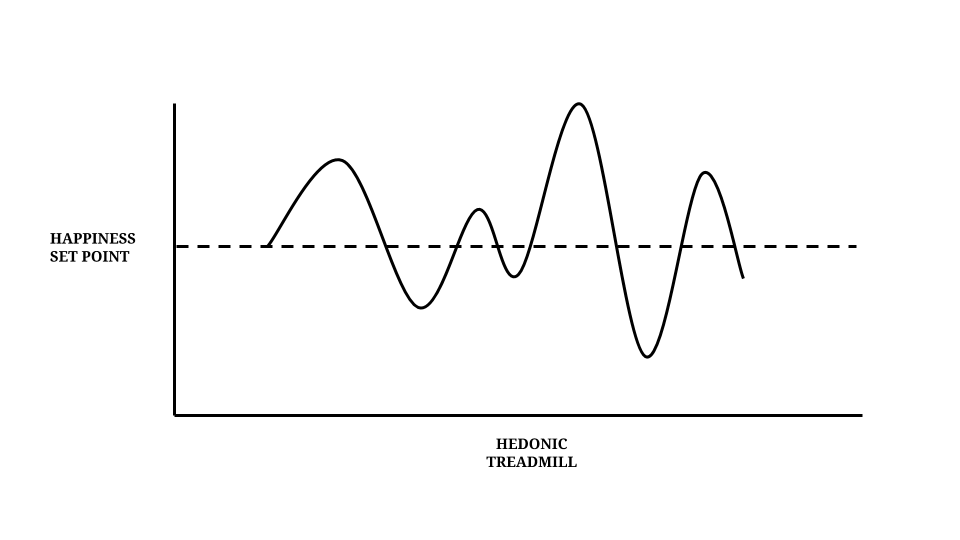This week a friend of mine told me she’s considering leaving Penn State. I asked her why and she told me that she’s having a hard time with her classes, she doesn’t have a large support system here, and most of all she’s unhappy. Hearing her say that broke my heart a little bit. I wouldn’t have guessed that she was struggling in that way, and it also made me sad to hear someone is unhappy here as I’ve been starting to feel happier and more at home.
This conversation really made me want to take a deeper dive into happiness theory so I can try to better understand the leading “methods” to attaining happiness. Last time, we described happiness using the work of Aristotle, who described happiness using the word Eudemonia. Which he defined as a much deeper feeling than how we normally use the word day to day. Using this understanding, that happiness can be attained by being the best version of yourself and achieving your full potential, let’s explore some of the leading theories of happiness.

Image from Pinterest
According to the Stanford Encyclopedia of Psychology, there are two leading candidates of happiness theory. The first is called hedonism. According to the paper, “Hedonists identify happiness with the individual’s balance of pleasant over unpleasant experiences.” In other words, just like how we might evaluate if we’ve had a good day or a bad day, hedonists evaluate whether or not they’ve had a good life- was there more good than bad? This theory brings up a point that is sometimes overlooked in the pursuit of happiness, that you don’t have to be happy all the time to be happy (eudemonic) overall.

Pictured above is the hedonic treadmill, a concept that explains how people return to a balanced state after both positive and negative events.
Image from Genetics of happiness: does happiness really depend upon ourselves? (nesslabs.com)
The second theory is called life satisfaction theory. This ideology identifies happiness as “having a favorable attitude toward one’s life as a whole.” While this might initially sound similar to hedonism theory, there’s one caveat. Life satisfaction theory involves some sort of judgment to affirm that one’s life was good. For instance, a religious person might seek validation from a higher being to affirm they have lived their life in a way deemed “right” or “good” by their religion.
Interpreted this way, life satisfaction theory loudly echoes Aristotle’s musings of happiness. Comparatively, hedonism takes a more narrow and individualistic approach as it focuses on one’s own sense of their life rather than living a life that contributes more to society and is validated by society.
There’s heavy scholarly debate about which theory is best, but that’s not why I’m sharing this information with you. I think that we can use the theory behind both ideas, perhaps picking and choosing based on our own values, to create our own happiness theory that can guide you to your own eudaimonia.
Until next time,
Avi
Sources
Hi Avi! This passion post was amazing to read (also I’m so sorry for the late response, I realized my comments were out of order). I think it’s really kind of you to take another look into the methods connected to the happiness theory, especially when someone around you is having a rough time. Taking into account how hedonists evaluate their overall life, I think it’s super interesting and eye-opening how we look at a bad day. I know I’m guilty of feeling upset when I have a bad day because I feel as though I wasted the entire day. However, reading the section about whether or not we had a good or bad life was very moving. I love how you provided two theories to look at the happiness theory and your ending was amazing. This passion post was great!
Avi, your reflection on happiness theory strikes a chord, especially in light of your friend’s struggles. It’s heartening to see you diving into into such profound concepts, seeking understanding not just for yourself but for those around you. Aristotle’s Eudemonia lays a solid foundation, reminding us that true happiness is more than fleeting pleasure—it’s about striving towards our fullest potential. Your exploration of hedonism and life satisfaction theory adds depth, highlighting the nuances of human experience. It’s a reminder that happiness is not one-size-fits-all; it’s as unique as each individual. Your willingness to share these insights is truly inspiring, at least to me. I am looking forward to reading more of your blog posts in the future.